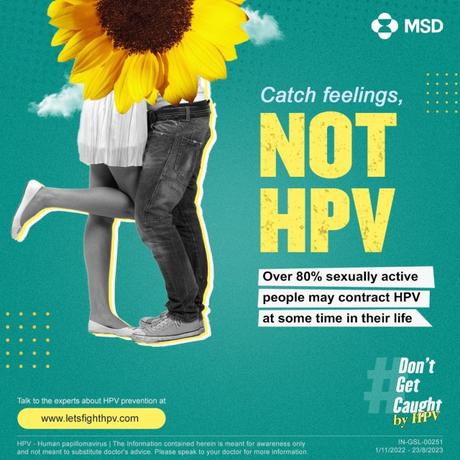HPV infection & Prevention!
“The times they are a-changin’”, as my favorite jingle goes. How, you would ask! Wellness trends for women are putting the power back in their hands.
Just a few decades ago, wellness for women meant taking more time off from the entire gamut of responsibility they were entrusted with. More often than not, this responsibility was home and family care. Sometimes, women were working outside homes, ‘shouldering’ equal responsibility in providing for the family. But more often than not, these jobs paid them much less.
With time came progress, in terms of better pay scales for women, societal support systems, and an understanding that women deserve as much as they wanted from life.
Today, young girls are much more aware of what they want from their careers, life experiences and are not shying away from exploring their sexuality.
Being sexually active and looking for fulfilling relationships, girls are not afraid to search for love right now, rather than waiting for it in a family-sanctified way, read: marriage. This is also a way to have a relationship just for the sake of it, exploring what they want in partnerships.
And here’s something I want to say to all girls out there who are taking charge of their destiny, you must arm yourself with knowledge.
At my clinic, I come across many young female patients from all walks of life who suffer from different types of vaginal and sexual infections. Most of them are recently sexually active and don’t know how to prevent sexually transmitted infections like HPV (Human papillomavirus) In fact, they don’t have any idea about HPV.
HPV is most commonly transmitted in people who are sexually active. It has affected around 660 million people worldwide. Some high-risk types of HPV can also lead to certain kinds of cancers – cervical, vaginal, vulvar, anal and oral cancers to name a few. It is worth noting that in India, the mortality rate of HPV-related cancers is about 60%
Every 5 minutes, one individual loses their life to HPV-related cancer in India.1
It’s time to educate yourself about HPV and spread the knowledge among your female friends, so that you can enjoy a healthy sex life.
Here are a few things that you should know about HPV, and its prevention.
1) What is HPV?
HPV is the most commonly transmitted viral infection of the reproductive tract, i.e it is an STI.2
It has been studied that mostly all sexually active people get exposed to HPV and end up contracting it within months to a few years of becoming sexually active. 3
Almost 50% of these infections are associated with a high-risk HPV type.3
Hence, every young adult woman must know about HPV.
2) How many different types of HPV are there?
There are over 100 different types of HPV. However, HPV can be categorized into two groups:
- Low-risk: non-cancer causing
- High-risk: HPV that is cancer-causing
According to the latest study, 14 of the 100 types are high-risk types.
3) How does HPV spread?
One can get infected with HPV by having vaginal, anal, or oral sex with someone who has the virus. 5
The peak time for acquiring infection for both women and men is shortly after becoming sexually active.6
So, HPV Prevention is much needed for feminine health.
A person with HPV can pass the infection to someone even when they have no visible signs or symptoms.
3a. Who is at risk of getting HPV?
Anyone who is sexually active can get HPV, even if they have had sex with only one person. You also can develop symptoms years after you have sex with someone infected. This is the reason you will not know exactly when you got the first infection and from whom.6
80% of sexually active Men & women get infected with HPV at some point in their lifetime!7
- Intimate skin-to-skin contact: It spreads mainly by direct skin-to-skin contact during vaginal, oral, or anal sexual activity.5
- Oral sex or deep kissing: It can spread through any kind of sexual activity such as oral sex or deep kissing.
- Safe sex: While infections are more likely found in people having many sex partners, you could be sexually involved with just one person and also using protection- condoms or dental dams still can get HPV.
- Other ways of spreading: It can also be spread by genital contact without sex, but this is not common. While oral-genital and hand-genital spread of some genital HPV types have been reported, there may be other ways to become infected with HPV that aren’t yet clear.5

While you may be concerned about HPV infection and spread, you DO NOT get HPV from:
- Toilet seats
- Hugging or shaking hands
- Swimming in pools
- Sharing food or utensils
4) What are the symptoms of HPV?
On the bright side in most cases, these infections mostly get cleared up on their own.
Some low-risk HPV may manifest in the form of genital warts.
Genital warts tend to happen in teenagers or young adults and those with a weak immune system. 9
4a. HPV and Cancer
In some cases, the Human Papillomavirus doesn’t go away on its own. In women, it can cause the growth of abnormal cells in the cervix. If left untreated, these cells may develop into cervical cancer. 4 Early-stage cervical cancer generally produces no signs or symptoms.
Apart from cervical cancer, HPV can cause other cancers as well including cancer of the vulva and vagina.9
HPV infections can cause:
- 99% of Cervical cancer
- 91% of Anal cancer
- 50% vulvar cancer
- 75% Vaginal cancer
Cervical cancer continues to remain the second biggest cancer affecting women in India and prevention will play a crucial role in advancing feminine health & wellness. 10
5) Can HPV be treated?
There is no treatment for the virus itself. There is, however, a preventive vaccine for HPV.
80% of HPV-related cancers are preventable.12
Your doctor can provide you with more information about it. Also, there are treatments for the health problems that HPV can cause e.g. Genital warts, Cervical precancers, and Other HPV-related cancers. But why let it reach that point, right? Especially when it can be nipped in the bud.
6) What is the recommended age for taking the HPV vaccine?
I strongly suggest you consult your gynaecologist or doctor for the recommended age to take the HPV vaccine. Consult them regarding your concerns around HPV and its prevention. You can also visit letsfighthpv.com and click on the talk to an expert button.
I hope the young girls reading this post have got some awareness related to HPV and will take care to follow safe sex practices and go in for regular screening. They can also speak to the doctor about the right age of getting a vaccine.
Remember, sexual health and wellness is your right, and let nothing hold you back, not even HPV.
Stay Aware, Stay Protected!
To know more about HPV, kindly check this website: https://letsfighthpv.com/ You can also speak to the expert on the website.
*Disclaimer– This article is meant to help create awareness and spread knowledge. One should consult their healthcare provider for any health-related information.
Issued in public interest with MSD India. This information is for awareness only. Please consult your doctor.
Photo courtesy: Pexels, MSD India FB page
References:
-
1-National Health Portal National Health Portal, https://www.nhp.gov.in/disease/communicabledisease/human-papillomavirus-hpvinfectionandcervical cancer#:~:text=HPV%20is%20one%20of%20the,is%20due%20to%20cervical%20cancer 2016 accessed on 5 Marc
-
2-Centers for disease control and prevention https://www.cdc.gov/mmwr/preview/mmwrhtml/rr5912a1.htm 2022
-
3-National Cancer Institute, https://www.cancer.gov/aboutcancer/causesprevention/risk/infectious-agents/hpv-and-cancer OCT 2021
-
4-Centers for Disease Control and Prevention. HPV and cancer. Basic information https://www.cdc.gov/cancer/hpv/basic_info/index.htm Accessed on 7 July 2020.
-
5-American cancer societyhttps://www.cancer.org/cancer/cancercauses/infectioushttps://www.cancer.org/cancer/ca ncer-causes/infectious-agents/hpv/hpv-andhpv-testing.htmlagents/hpv/hpv-and-hpv-testing.html 26 October, 2021 accessed on 2 March 2022
-
6-Centers For Disease Control & Prevention https://www.cdc.gov/condomeffectiveness/latex.html
-
7-Harvard health publishing,https://www.health.harvard.edu/blog/hpv-transmissionduringoralsex-a-growing-cause-of-mout h-and-throat-cancer-201306046346#:~:text=Sexual%20contact%2C%20including%20oral%20sex,cancer%2C%20depending%20on%20your%20age, June 2013
-
8-Walboomers JM, Jacobs MV, Manos MM, et al. Human papillomavirus is a necessary causeof invasive cervical cancer worldwide. J Pathol. 1999 Sep;189(1):12-19 https://hpvcentre.net/statistics/reports/IND_FS.pdf 9 HPV Center https://hpvcentre.net/statistics/reports/IND_FS.pdf
-
9-World Health Organisation. Factsheet. Human papillomavirus (HPV) and cervical cancer. https://www.w-ho.int/news-room/fact-sheets/detail/human-papillomavirus-(hpv)-andcervicalcancer Accessed on 3 March 2021
-
10-Centers for Disease Control & Prevention https://www.cdc.gov/std/hpv/stdfact-hpv.htm Accessed on Oct, 2020
-
11-HPV Center https://hpvcentre.net/statistics/reports/IND_FS.pdf 13 WebMd. What is HPV.https://www.webmd.com/sexual-conditions/hpvgenitalwarts/hpvhttps://www.webmd.com/sexual-conditions/hpv-genital-warts/hpv-virusinformationabout-human-papillomavirus – 1virus-information-about-human -papillomavirus#1 Accessed on 3 March 2021.

